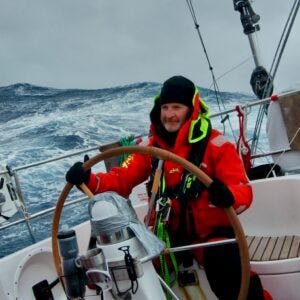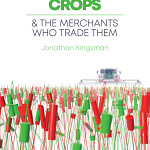We don't trade the commodity; we trade for the client.
Good morning, Mark, and thanks for taking part in Commodity Conversations. Could you please tell me about Scipio and your journey so far?
We describe ourselves as merchant traders.
I had thoroughly enjoyed five years through Marc Rich's evolution into Glencore where my boss, Michael Rembaum, had given me exciting challenges in China, Thailand and Indonesia. However, I'd always had a love affair with Africa.
After university, I went with a friend to Kenya and was smitten by its beauty and vastness. I had always wanted to return, but with a purpose and a role, not as a tourist. I discussed it with Michael, and he said, "If you want Africa, I'll give you three months. Travel around and see what business you can bring in."
At that time, some African regions were experiencing a severe drought and a subsequent maize shortage. I put together a deal to trade 150,000 tonnes of South African maize into Malawi, but there were not the same opportunities in sugar. In 1998, I left Glencore Sugar and moved to Johannesburg for Glencore Grain.
I spent the first six months learning about grains and Africa. Glencore had told me my boss would retire in a year, and I'd take over. However, he retired within a few months, and Glencore parachuted in some chap from the Netherlands who had little feel for or knowledge of the African context. I realised I couldn't work under him and voted with my feet. At 29, I was young enough to take that risk.
It was only a year into the Glencore shareholding, so I cashed in my 50 Glencore shares and raised $100,000 from a family friend. He also let me use $150,000 of an overdraft facility on one of his bank accounts. I started trading.
My first trade was selling Ugandan maize to the World Food Program (WFP). I then did numerous cross-border maize trades, taking South African non-GMO maize into Malawi, Zimbabwe, and Zambia. I didn't think I was untouchable, but success came quickly.
By 2003, we were the leading player in Zambia and Malawi. Then, we sold 20,000 mt of maize to the Zambian Vice President’s disaster relief fund, but they never opened the LC. I had bought the maize from Tanzania for $300 / mt DAP Lusaka, but Zambia then had a bumper harvest, and the market fell to $120 / mt. The loss almost wiped out our balance sheet.
Swazi Sugar threw me a lifeline by giving me a 10,000 mt allocation of their brown sugar for the export market. We began to crawl back and opened up the Kenyan import market for COMESA in sugar. We were back into the game.
It's easier to lose money than earn it, and it takes less time. Once I had gone through the experience of being overconfident, I wasn't about to make the same mistake twice. It taught me a more systematic, careful approach to the business.
I got married in 2006, and we quickly had two children. Jacob Zuma was coming into the forefront of the South African political scene and became president in May 2009. My wife, who is South African, and I had always agreed that we would move back to Europe for the kids at some point. We decided the time was right and moved to Geneva in January 2010.
I incorporated Scipio SA in Geneva. Mike Tuckey, former head of Glencore Agriculture, had retired by then and took a stake in Scipio. I took the balance.
Mike was an important mentor for me. It sounds simple, but it meant a great deal to me to know that somebody of his success would not only give their capital but award me their time.
I would have been financially better off if I had stayed at Glencore. However, I've led the life of an adventurer, with trading and adventure happily coexisting. I've been able to steer my ship to whichever destination port I wanted, to explore different commodities, and not work within a regimented organisation. I've probably had a happier existence as a result. However, I have always been proud of Glencore's success.
As a small trading company, what is your biggest challenge? Is it competition from the big guys? Is it finance? Is it recruitment? Is it counterparty risk?
In the last 20 years, the big guys have just got bigger. If you collectively put them into a room, they're not the perfect shape to fill that room. There are gaps between them, and we trade those gaps. I don't need to compete with them. I tidy up around them. We know our clients inside and out. We don't just trade grains but also sugar, rice, and proteins in the form of soya and soya bean meal. A typical client may have a distribution business where he sells 50 kg bags of sugar, but he may also have a small flour mill and an animal feed business. Scipio's model lends well to those types of companies. We don't trade the commodity; we trade for the client.
The big tradehouses can't spend time, say, going to an Indian Ocean Island and figuring out what a client needs. The senior trader would say, "Hang on a moment, you did a one-week tour of the region. I wanted you to bring back a 25,000-mt wheat sale. Don't start talking to me about 20 boxes of soybean meal." It is where we fit into the commodity space without competing with the big boys.
Finance has controlled Scipio's growth, but my search for ‘good clients in challenging markets’ has controlled our growth more. It may be a bottler in Harare, Zimbabwe, with a great business, but the macro picture of how they must operate regarding forex is complicated. These are the companies we work closely with.
You mention finance. Was it a problem?
When I started in Geneva, we had a credit line with BNP Paribas. Then, Basel III happened, and the bank withdrew the line. The head of the trade finance department took me to lunch in the most expensive restaurant in Geneva to tell me that I was no longer a bank client. I told him he could have just done it over the telephone. We lost our financing.
Mike matched me on the capital in the business, and we spent ten years without a bank line, using the company's assets and turning every dollar about four times a month. We now have a line with BIC-BRED, with almost the same personnel who were with me at BNP.
What about recruitment – is that a challenge?
I am careful with the people I employ. I want to ensure that they enjoy life as a merchant trader. I've had one or two successes and one or two that have used us as a stopgap. ADM took the last two people who left Scipio. It tells me you can get a better grounding at the Scipio School of Trading than with some big boys.
What about counterparty risk?
I have only had two acts of blatant theft in the past 15 years. Both were people I knew well or thought I knew well. I allowed them control of the goods. One was looking after a warehouse in Nairobi and stole the product. The other was an ex-UN guy who wanted to do some trading into Nairobi. I liked him and sent him $50,000 worth of goods. He never paid for them.
How important has the World Food Program been for your business?
It worked well in the early days. They understood the parameters of maize in East Africa and had good people working for them. However, I'm not the greatest fan of the WFP; their terms are austere and somewhat inflexible. You end up dealing with an NGO with demands bigger than any trading company.
How do you see the company developing? Where do you go from here? What are your plans?
It would be a shame if, in five years, I woke up one morning and said, "I'm turning 60; the kids have finished university. Thanks very much, good ship Scipio. You've served me well. I will take out the cargo and let the boat go."
I don't intend to let the boat go. It will change and evolve, and I may play a backseat role for a few years, but we will continue to sail.
Let's move on to your 2022 sponsorship of Kirsten Neuschäfer in the Golden Globe Race. How did that come about, and how involved were you?
Kristen is my wife's first cousin. She sent a family round-robin email saying she had entered the Golden Globe and asked if anyone could help. I read the email and thought, "I can do this. I can help.”
Twenty-two competitors signed up, and fourteen started the race. One turned back within the first week, and only three boats finished within the race format. Two finished under what's called Chichester class, which meant they had an issue that required outside help. The rest retired.
Kirsten won it. It took her 233 days, 18 hours, 43 minutes and 47 seconds.
You also sponsored Neil Heritage, an Iraqi war veteran and double-knee amputee. How did that come about?
I attended his talk in Geneva to raise funds for the Climb2Recovery Foundation. Neil had set himself the objective of climbing the Matterhorn. It took him six years and four attempts. This shows that life doesn't end when you lose a limb. His life, albeit a different life, started at that point. He is strong and tenacious, and nothing is impossible.
What did Scipio get out of these sponsorships?
There was no immediate financial gratification. It was about showing our clients what makes me tick. If there are people with a passion in life, support them, and the wheel will turn. Life is bigger than just trying to get half a dollar a tonne somewhere.
I thought, "Well, I can't do these things, but I love that both of you are doing them."
It was a relatively short period with Neil because, within two weeks, he succeeded or failed. With Kirsten, there was a six-month build-up, and we went to the race start. Every morning, I would wake up and look at the tracker app. When I got to the office, I would listen to the event organiser's 20-minute briefing on what had happened overnight. It was what we did for a year. It was fantastic, and I lived utterly vicariously.
Seeing Scipio's logo on CNN was fun, but the journey was necessary: the preparation, the setbacks, and the successes. It was beautiful to be part of the story, part of a brilliant team. Her zest for adventure and her beauty as a human brought her team together.
Kristen cycled the length of Africa when she was 22 years old. Would you have liked to have done that? Are you living your dream through other people?
Would I have liked to cycle the length of Africa as a 22-year-old? I probably would have preferred to have climbed seven summits. I had a burning ambition to get ahead and to be in the workplace. Scipio has allowed me to be an adventurer.
You took part in the Ocean Globe Race – was that an adventure?
I got to know the organiser of the Ocean Globe Race, and I tried and failed to find corporate sponsorship for him. He offered me a berth on leg three around Cape Horn for my efforts. It's the Everest of the sailing world, something every offshore adventure sailor wants to do once.
It was a quieter time for the company as we had just completed a successful sugar import programme into Kenya. Mike and I were happy that the ship was in order and that our two traders could handle the ongoing business.
I flew to Auckland and arrived with a certain amount of imposter syndrome. I spent five days working on the boat, getting to know the other participants, and my imposter syndrome lessened a little. All I wanted to do was start the race. Once we did, we had three days hugging the New Zealand coast. It was so beautiful, an incredible backdrop. I woke up to go on watch on the fourth day, and there was no land.
But then I was in it. I was at the bottom of the pecking order and the least experienced of the crew. It gave me an advantage as no one had any expectations. All I could do was be a good crew member and be happy to get involved when waves were going over the bow and I had to put a reef in or shake it out.
We were twelve in a 57-foot Swan, and after a while, some people couldn't stand being close to one another, and small arguments broke out. There was a big difference in the cultures. Two older French guys were permanently angry about everything. The younger crew coped better with being in that closed environment. We coexisted more easily.
All you had to do was get in there, make sure you were never late on watch, play your part. Each watch lasted six hours and could be during the middle of the night. It was bitterly cold when we were close to Antarctica. There'd be one person on the helm and the other on watch. Your teeth are chattering. It's pitch dark. If you're lucky, there are stars, but you must look all around you for dangers like other vessels, containers, anything like that.
I wasn't the skipper of the ship. I experienced what it's like to be an employee. I learned to look at my business from the perception of the employee and not from the master of the ship. I learned to listen to my team and allow them the space to air their thoughts.
Last question: what advice would you give to a young person starting in the business today?
First, don't get pigeonholed into one specialised part of the trade, whether futures, logistics, or the physical book. Fight to see every part of the business and obtain a thorough overview of the company you're working for. Only if you understand the complete business will you be able to add value and hopefully make some money.
Second, your success will be positively correlated to the amount of effort and work you put in. There is no such thing as a lucky trader. There are good traders, and good traders sometimes seem lucky. However, they're good because they know what they're doing and have done the hard work. Luck happens when opportunity meets preparation.
Third, the life of a merchant trader doesn't have to be lonely if you work as a team. My success wholly depends on my team's happiness and willingness to work with me. My team allows me, as skipper, to get off the boat and leave a helmsman. Invest in your team, and they will reward you by allowing you to lead the life of an adventurous merchant trader.
© Commodity Conversations®2024
The attached podcast was AI-generated by Google’s NotebookLM








